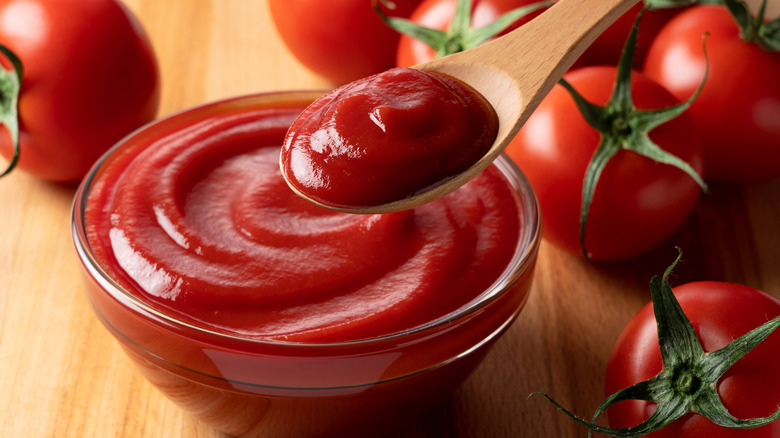What Happens To Ketchup When It Expires?
Odds are that you have one, two... maybe even three bottles of ketchup in your kitchen right now. It's one of those highly popular condiments that you can put on just about anything, whether it's French fries, onion rings, chicken strips, burgers, or even scrambled eggs! Ketchup is great for a few reasons, one is that attractive red hue that brightens up any dish, and another aspect is the flavor; the perfect balance between acidic and sweet which livens up almost any meal.
When we think of ketchup today, we think of tomato ketchup, but historically speaking, ketchup wasn't always made from tomatoes. According to History, during the 18th century, ketchup was made from a variety of fruits, vegetables, nuts, and shellfish! These ingredients would be boiled into a syrupy liquid and salted to create flavorful mixtures to add to a wide variety of dishes. Apparently, mushroom ketchup was a favorite condiment of world-famous romance author Jane Austen. It wasn't until 1812 that tomato ketchup was created by James Mease in Philadelphia, Pennsylvania.
Tomato ketchup is made with various different kinds of tomatoes and ratios depending on the producer, but according to Silverson, a few of the tried and true basics remain the same when it comes to making a bottle of ketchup. The ketchup sitting in your refrigerator is made with a tomato paste concentrate and then mixed with water, sugar, vinegar, salt, and the maker's choice of seasonings.
Color and smell
Because many individuals are infatuated with ketchup, they tend to use up a bottle before it goes bad, especially if there are children dousing it on everything at home. However, it's important to know that your tomato ketchup can, and will, go bad if you give it enough time. My Recipes claims that an open bottle of ketchup may last half a year (six months) in a refrigerator without going bad. This is because tomato ketchup is acidic and takes longer to decompose. But when it finally passes the point of no return, you'll notice a few changes.
The Eat By Date explains that when ketchup finally goes bad the liquid in the bottle will begin to separate, and as it does, the heavier liquid will begin to change color. You will see it shift from bright red to an almost wine-dark hue. The taste will begin to alter and ultimately, there will be a sour or yeast note to the condiment and mold will eventually make itself at home in the bottle (via Can it go Bad). It is best not to consume food products once they've gone bad or you might experience food poisoning.

